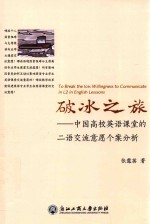图书介绍
破冰之旅 中国高校英语课堂的二语交流意愿个案分析PDF|Epub|txt|kindle电子书版本网盘下载

- 张露茜著 著
- 出版社: 杭州:浙江工商大学出版社
- ISBN:751781477X
- 出版时间:2015
- 标注页数:277页
- 文件大小:28MB
- 文件页数:302页
- 主题词:英语-课堂教学-教学研究-高等学校
PDF下载
下载说明
破冰之旅 中国高校英语课堂的二语交流意愿个案分析PDF格式电子书版下载
下载的文件为RAR压缩包。需要使用解压软件进行解压得到PDF格式图书。建议使用BT下载工具Free Download Manager进行下载,简称FDM(免费,没有广告,支持多平台)。本站资源全部打包为BT种子。所以需要使用专业的BT下载软件进行下载。如BitComet qBittorrent uTorrent等BT下载工具。迅雷目前由于本站不是热门资源。不推荐使用!后期资源热门了。安装了迅雷也可以迅雷进行下载!
(文件页数 要大于 标注页数,上中下等多册电子书除外)
注意:本站所有压缩包均有解压码: 点击下载压缩包解压工具
图书目录
List of Tables1
List of Figures1
Chapter 1:Introduction1
1.1 Research problem1
1.2 Research motive3
1.3 Research aim and questions4
1.4 Significance of the study5
1.5 Outline of this thesis6
Chapter 2:Chinese Context8
2.1 English in China8
2.1.1 China English13
2.2 College English17
2.3 Willingness to Communicate(WTC)19
2.4 Conclusion22
Chapter 3:Literature Review23
3.1 Establishment of WTC in L124
3.2 Establishment of WTC in L228
3.3 Development of L2 WTC studies and theories31
3.3.1 Recent L2 WTC studies outside China35
3.3.2 Recent L2 WTC studies in China43
3.4 The Chinese WTC model52
3.4.1 Factors in Chinese WTC model52
3.4.2 Challenged collectivistic outlook of the Chinese63
3.5 Conclusion64
Chapter 4:Methodology66
4.1 Research design66
4.1.1 Procedures69
4.2 The case study approach70
4.3 Research setting and participants72
4.4 Instruments74
4.4.1 Questionnaires74
4.4.2 Documents78
4.4.3 Student narratives81
4.4.4 Classroom observations82
4.4.5 Stimulated recalls84
4.4.6 Semi-structured interviews85
4.5 Data analysis procedures88
4.6 Ethical issues91
Chapter 5:Pilot Study93
5.1 Pilot Study One93
5.2 Pilot Study Two95
5.2.1 Data screen95
5.2.2 Exploratory Factor Analysis(EFA)97
Chapter 6:Study One105
6.1 Data screen105
6.2 Findings107
6.2.1 Confirmatory Factor Analysis(CFA)108
6.2.2 Multi-group Confirmatory Factor Analysis(MGCFA)112
6.2.3 Structural Equation Modeling(SEM)118
6.2.4 Multi-group Structural Equation Modeling(MGSEM)124
6.3 Discussion130
6.3.1 Research Questions One:Personal factors that facilitate and hinder BE students'WTC and Three:Interactions between personal and contextual factors133
6.3.2 Research Question Four:Pedagogical changes138
6.4 Conclusion140
Chapter 7:Study Two142
7.1 Participant information in qualitative studies142
7.2 Document analysis outcomes144
7.3 Classroom observation findings147
7.4 Teacher interview results156
7.4.1 Teacher with weak classroom context157
7.4.2 Teacher with supportive classroom context160
7.5 Discussion163
7.5.1 Research Question Two:Contextual factors that facilitate and hinder BE students'WTC164
7.5.2 Research Question Three:Interactions between personal and contextual factors168
7.5.3 Research Question Four:Pedagogical changes169
Chapter 8:Study Three173
8.1 Student narratives173
8.1.1 High WTC and weak context175
8.1.2 High WTC and supportive context177
8.1.3 Low WTC and weak context179
8.1.4 Low WTC and supportive context181
8.2 Stimulated Recalls183
8.3 Student interviews185
8.3.1 Societal context187
8.3.2 Personality189
8.3.3 Motivation191
8.3.4 Attitudes193
8.4 Discussion195
8.4.1 Research Question One:Personal factors that facilitate and hinder BE students'WTC195
8.4.2 Research Question Three:Interactions between personal and contextual factors199
8.4.3 Research Question Four:Pedagogical changes200
Chapter 9:Discussion205
9.1 Combining findings205
9.1.1 A three-dimension Chinese L2 WTC model205
9.1.2 Data combining outcomes208
9.2 Relating findings with previous L2 WTC studies211
9.3 Lack of teacher support212
Chapter 10:Conclusions216
10.1 Research mission of the study216
10.2 Summary of findings218
10.2.1 Research Question One:Personal factors that facilitate and hinder BE students'WTC219
10.2.2 Research Question Two:Contextual factors that facilitate and hinder BE students'WTC221
10.2.3 Research Question Three:Interactions between personal and contextual factors223
10.2.4 Research Question Four:Pedagogical changes224
10.3 Limitations and future research227
10.4 Conclusion228
References230
Appendix A:WTC Questionnaires in spoken English in English language classrooms260
Appendix B:Classroom observation sheet268
Appendix C:Stimulated recall questions269
Appendix D:Interview questions with BE students270
Appendix E:Interview questions with English teachers273
Appendix F:Thematic coding of qualitative data274
Appendix G:A sample student narrative275